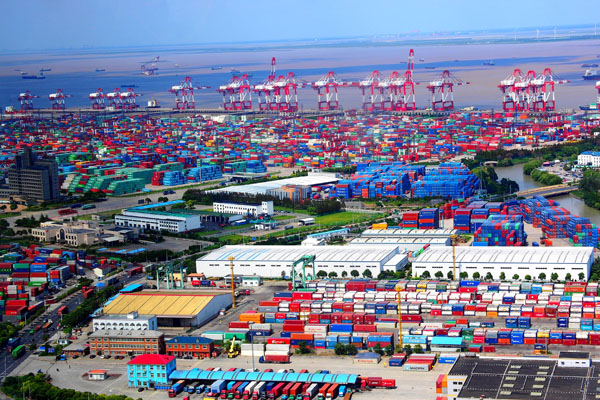FTZ to define development
 0 Comment(s)
0 Comment(s) Print
Print E-mail China Daily, September 28, 2013
E-mail China Daily, September 28, 2013
The central government unveiled on Friday the first batch of initiatives in a general plan that set the tone and scale of the China (Shanghai) Pilot Free Trade Zone, which is expected to help shape the economic landscape in years to come.
|
|
|
A bird's-eye view of the Shanghai Waigaoqiao Free Trade Zone. [Xinhua] |
These initiatives touch on some key sectors of the economy, including finance, commerce and industry. Some of them represent major policy changes to facilitate the economic restructuring that is deemed necessary to ensure sustainable growth.
Since the idea was first broached earlier this year, the FTZ has caught the imagination of the business community because of its promise of changes that will bring new opportunities to domestic and foreign enterprises.
It is seen as a bold step in economic reform that will redefine the role of government and further open up the economy to the private sector.
Shanghai stands to benefit the most because it is expected to play host to an expanding financial services sector and become a regional hub for trade and commerce.
"These steps are all part of China's long-term blueprint as the government tries to shift the economy away from a reliance on investment toward more innovative industries," said Kenneth Jarrett, president of the American Chamber of Commerce in Shanghai, which represents around 3,600 US businesses operating in the city and its neighboring provinces.
"One thing significant about the zone is its relationship to China's economic reform agenda. Because there are a lot of talks about the need to rebalance the economy and make it more market-oriented, the FTZ is a signature piece for the whole process," he said.
On the financial front, the test zone will encourage yuan's convertibility, interest-rate liberalization, and further cross-border interaction, so that companies in the FTZ will be encouraged to take advantage of both onshore and offshore markets. One thing worth noting is that it will allow the setting up of a trading platform integrated with the global markets and gradually allow foreign companies to engage in commodity futures trading and encourage financial innovation, said a report by the research arm of the Australia and New Zealand Banking Group.
The guideline also provides an equal market access to foreign investors by scrapping technical restrictions and lowering quality standards in six areas ranging from finance and shipping to commercial and cultural services.
The establishment of the free trade zone is likely to ease concerns over market access, which is identified as one of the major non-tariff obstacles, said Gerry Mattios, principal of consultancy Bain & Co.
"I think a lot of companies are looking forward to the zone to overcome this barrier, because it is expected to enable foreign companies to set up operations more easily and consequently facilitate trade," he said.
Under the new guideline, foreign health and medical insurance providers will be permitted to operate in the zone on a trial basis and foreign partners will be allowed to hold larger stakes in joint venture global shipping enterprises.
The clauses include shortcuts for foreign banks to set up subsidiary or joint venture operations.
Foreign companies will also be allowed to offer "specialized telecommunications services" within the zone.
Foreign travel agencies will be permitted to set up joint ventures to provide international travel services to Chinese nationals.
As requested by the State Council, the FTZ will also explore a "negative list" management approach, which will outline restricted sectors. Any sectors not on the list will be free for entry.
"This ‘negative list' approach and new investment rules are in accordance with international practices. For example, foreign investments in the FTZ and overseas investments by local enterprises will not require official approval from government agencies, but only need to follow the ‘archival filing management' process," said the ANZ study.
Frances Cheung, an economist at Credit Agricole CIB, said in a research note: "As expected, the major focus, for the first phase at least, is on promoting trade."







Go to Forum >>0 Comment(s)